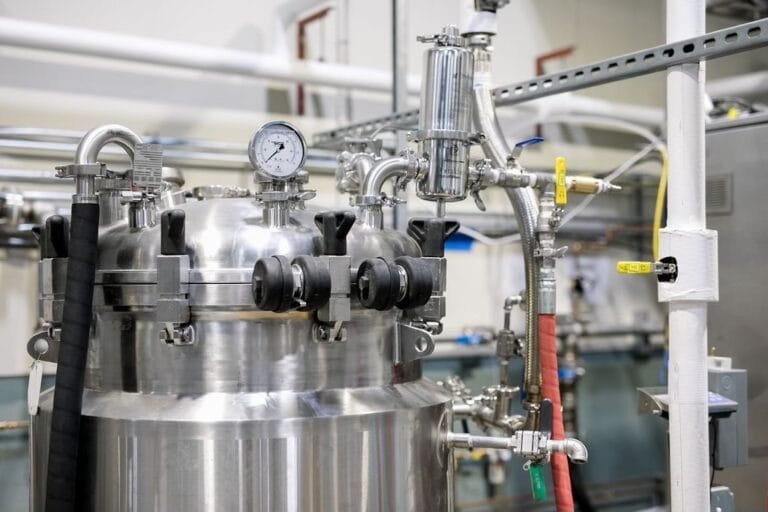Aviation sustainability will primarily be enabled by energy dense sustainable liquid fuels in the near, medium and long term. Today, Sustainable Aviation Fuel (SAF) is a drop-in fuel (when blended with Jet A) that easily integrates with existing aviation engines and fuel delivery infrastructure and, over time, SAFs could potentially contribute 65 percent of the reduction in emissions needed by the aviation sector to reach net zero in 2050.
CleanJoule has invented a novel SAF pathway that lead to the creation of CycloSAF, which contains a higher proportion of cycloalkanes that renders the fuel 10 percent more energy-dense than Jet A, ultimately having the ability to enable flights on 100 percent SAF; eliminates aromatics, which impacts non-CO2 emissions including soot; Utilises biomass from the forestry industry that is derived from non-food crops (trees, plants, agricultural residue, pulp, etc.) as well as corn stover for its feedstock. There is an abundance of this biomass globally, largely in rural areas of countries, which enables CycloSAF to scale to meet aviation’s rising fuel demands; and is created via a relatively simple two-step manufacturing process. This process is cost-effective and carbon-efficient. Our manufacturing facilities are also, therefore, easier and less expensive to get online.
“CycloSAF is one product within a large and nuanced SAF industry. To date, only eight SAF pathways have been qualified by ASTM International – meaning they have the permission to sell their fuel at scale,” Mukund Karanjikar, CEO and founder of CleanJoule, stated.
“Even with that permission, the companies tapping those pre-approved pathways don’t inherently have the ability to sell at scale. At CleanJoule, we are working to certify a ninth, superior SAF pathway while simultaneously building out our manufacturing plants such that when we have permission to sell, we also are ready to sell and deliver CycloSAF industry-wide.
“Due to industry predecessors being delayed in their plant builds and therefore production volumes and delivery of literal gallons of SAF, we must earn the trust of our customers – our partners – each day as we progress towards qualification and scale.
“Ensuring the market understands the unique value of our CycloSAF product (10 percent more energy density, no aromatics, etc.) and the potential scale of our pathway in the face of those that are popular today such as HEFA (which in 15 years time will be de minimis in the volume it can deliver for the industry’s needs) is the primary hurdle we face in the coming months and years.
“We are already several months into the ASTM International qualification process and our fuel is already at the 3rd party evaluation sites. We are confident that once qualified, adoption of CycloSAF will not be an issue as the demand for SAF is so massive and underserved. The winners in this category will be those that can actually meet the order volume they receive. Your primary competition in this market is yourself and your own scalability.”
Circular economy
By developing and delivering a product that taps a more abundant feedstock, CleanJoule are able to materially benefit the growing bioeconomy, rural economies, and contribute to national security in many forms.
The feedstock for CycloSAF exists everywhere on the planet, unlike petroleum, where some countries have more and others have none. It also happens to be in rural areas of all countries.
“It does an excellent opportunity to develop an industry of tomorrow and create jobs for rural, less privileged populations in their respective countries,” Karanjikar outlined.
“Furthermore, SAF presents an opportunity to bridge the agrarian economy with farmers, ranchers and foresters with the industrial economy of SAF manufacturing and aviation.
“Our approach makes our SAF product cost-competitive with jet fuel at scale. By decoupling feedstock conversion to hydrocarbons from the final SAF production process we have been able to optimise each step to yield greater carbon efficiency and a lower cost final product.
“Overall, our mission is to make aviation fully independent from the petroleum industry thereby reducing the impact of price volatility and foreign dependence.”
Route forward
IATA says achieving net-zero by 2050 will require at least a 65 percent decarbonisation contribution from SAF. To achieve the targets the industry will have to go 100 percent SAF in the short order.
Since CycloSAF is heavier / denser than Jet A, CleanJoule has the ability to be the 100 percent drop-in replacement for Jet A (with no blending with Jet A required) that the industry needs in the near-term. Once regulation and approvals adjust so that SAF can fill 100 percent of the tanks, CleanJoule’s tech will be part of bringing about that evolution.
Many corporations are looking to offset their Scope 3 emissions – or those that are indirectly generated in the course of doing business – in order to meet their sustainability goals. This includes emissions derived from employee air travel. Companies can invest in the production of solutions like CycloSAF and get credit for the environmental benefits.
“Our $50M+ round of funding last year enabled us to rapidly accelerate our SAF manufacturing,” Karanjikar highlighted. “We are working on a blueprint for commercial-scale manufacturing plants with strategic locations in mind. Indigo Partners is an oracle in aviation and has investments in multiple airlines around the world. They’ve elevated the entire field to a new standard.
“Our three airline investors transport more than 110M+ passengers each year: Frontier Airlines is the greenest airline in America, the CEO of Volaris has helped the Government of Costa Rica with a vision to standardise fuel cost and the founding of Wizz has been a defining moment in European aviation.
“CycloSAF is on the path to ASTM International qualification and we are simultaneously building out our first demonstration manufacturing plant.
“We believe that these two actions set us up for success to be able to produce CycloSAF at scale rapidly as our sub-scale plant will serve as a blueprint for larger manufacturing plants to be built out in due time.”



